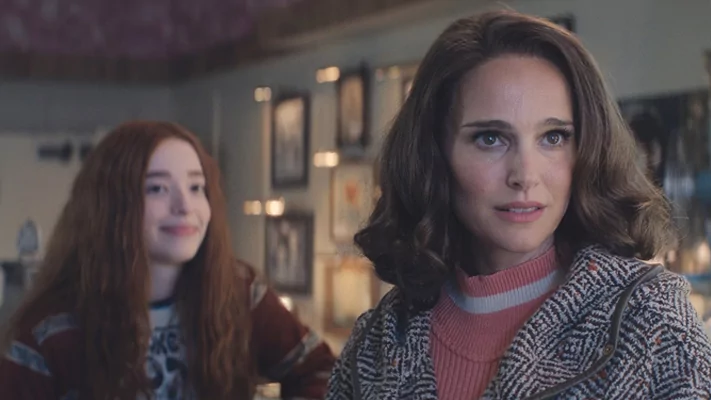The road is as familiar as it is well traveled. An ingénue enchants us all with her puckish charm. Half a decade later, she strikes it rich with a Marvel/Star Wars project or three. Perhaps the occasional award bait falls into her lap, but, time being what it is, every offer soon begins to look enticing. One minute she’s accepting an Oscar for headlining a Darren Aronofsky masterpiece. The next she’s married to Murray from Stranger Things in a tedious racism-of-the-week miniseries.
Such is the career arc of Natalie Portman, the early-aughts “it” girl turned edutainment antihero. In her most recent serious project, 2023’s May December, the Israeli American played an actress sucking the metaphorical blood of a Mary Kay Letourneau type she hoped to portray on film. Portman’s latest role is as a housewife-cum-journalist investigating the murder of a black woman in midcentury Baltimore. In both instances, the former starlet’s character exists to critique “white female privilege,” a leftist bugbear that transforms anthropological interest into “harm.” Is it surprising to find a performer of Portman’s fame in such parts? It shouldn’t be. Had the Black Swan star passed, Alicia Vikander or Elizabeth Olsen would surely have come aboard.

Of course, even a vaguely sad career choice can lead to passable entertainment. Apple TV+’s Lady in the Lake certainly tries hard. Based on Laura Lippman’s novel of the same name, the limited series belongs to a flourishing genre of gal-meets-noun productions (The Girl on the Train, The Woman in the Window) that, while never quite good, are at least evocatively staged. One might expect, given its well-received source material, that Apple’s Lady would rise to that middling standard. Alas, no. A baffling and chaotic affair, the show is as poorly made as any television drama we’re likely to see this year. Moreover, it exposes afresh its lead actress’s long-standing stiltedness on-screen. If Portman wants a future beyond Dior ads, she had better pray that casting directors forget this outing soon.
The actress plays Maddie Schwartz, a Jewish homemaker and former high school reporter wed to the dull but upstanding Milton (Brett Gelman). When, on the morning of Charm City’s 1966 Christmas parade, an 11-year-old goes missing, Maddie experiences an emotional crisis that sends her fleeing her marriage. Because the young girl in question is not the titular slain “lady,” a secondary plot must run alongside the first. In this storyline, an African American activist named Cleo Johnson (Moses Ingram) works for the betterment of the black community, even as she hurtles toward the events that will lead, a month later, to her death.
The practical tethering of these narratives is simple enough: Shattered by the missing child’s death, Maddie begins digging into Cleo’s. Their thematic connection, however, is what really counts. Both of our heroines are reckless strivers, increasingly desperate to break the shackles of sex and circumstance. In Maddie’s case, this means putting aside traditional values in the name of self-actualization. (In addition to leaving her husband, Portman’s character abandons a son and commences an affair.) Cleo, meanwhile, runs up against a different set of rules. To make ends meet, she must work for unrepentant gangster Shell Gordon (The Wire’s Wood Harris). Yet doing so disqualifies her for a place in an activist community that must, given the era, maintain appearances.
Had Lady in the Lake been filmed 15 years ago, it might have been a straightforward liberation parable in the style of The Hours (2002), Stephen Daldry’s feminist fantasia in multiple keys. Since this is 2024, a darker ideology gets its say. Peppering the show’s action is an ill-designed voiceover track in which a dead Cleo scolds Maddie for caring about her murder. (“You came at the end of my story and turned it into your beginning.”) Six weeks ago in these pages, I reviewed Netflix’s Eric, which condemns white people for failing to notice a black man’s death. Lady in the Lake takes the opposite tack without batting an eye. If one didn’t know better, one might suppose that the point is to bring white viewers under political discipline, not to impose a coherent “antiracist” standard.
Unlikable characters, ideological complaint: Is there anything Apple’s latest doesn’t offer? One possible answer is a clear sense of what is literally happening on-screen. Another is pacing decisions that make a lick of sense. Among the tricks in creator Alma Har’el’s (Bombay Beach) tool bag are dream sequences and symbols that bleed messily into her characters’ real lives. Frequently presented as montages, these moments are insufficiently distinguishable from what is actually taking place. Perhaps such self-conscious “artfulness” would work if the series weren’t already overstuffed and overlong. It is though. So caught up is Har’el in minor subplots and digressions that the main thrust feels at times like an afterthought.
Given recent resurgences of the oldest hatred, we should be relieved that an Israeli showrunner can still cast an Israeli actress in a role that emphasizes her Jewishness. It would be a great shame if such productions were tacitly outlawed in Hollywood. As things stand, however, the ignominy belongs to Har’el, Portman, Apple, and everyone else involved in Lady in the Lake’s creation. They got to make the show they wanted, thank God. But it is terrible.
CLICK HERE TO READ MORE FROM THE WASHINGTON EXAMINER
Graham Hillard is editor at the James G. Martin Center for Academic Renewal and a Washington Examiner magazine contributing writer.























